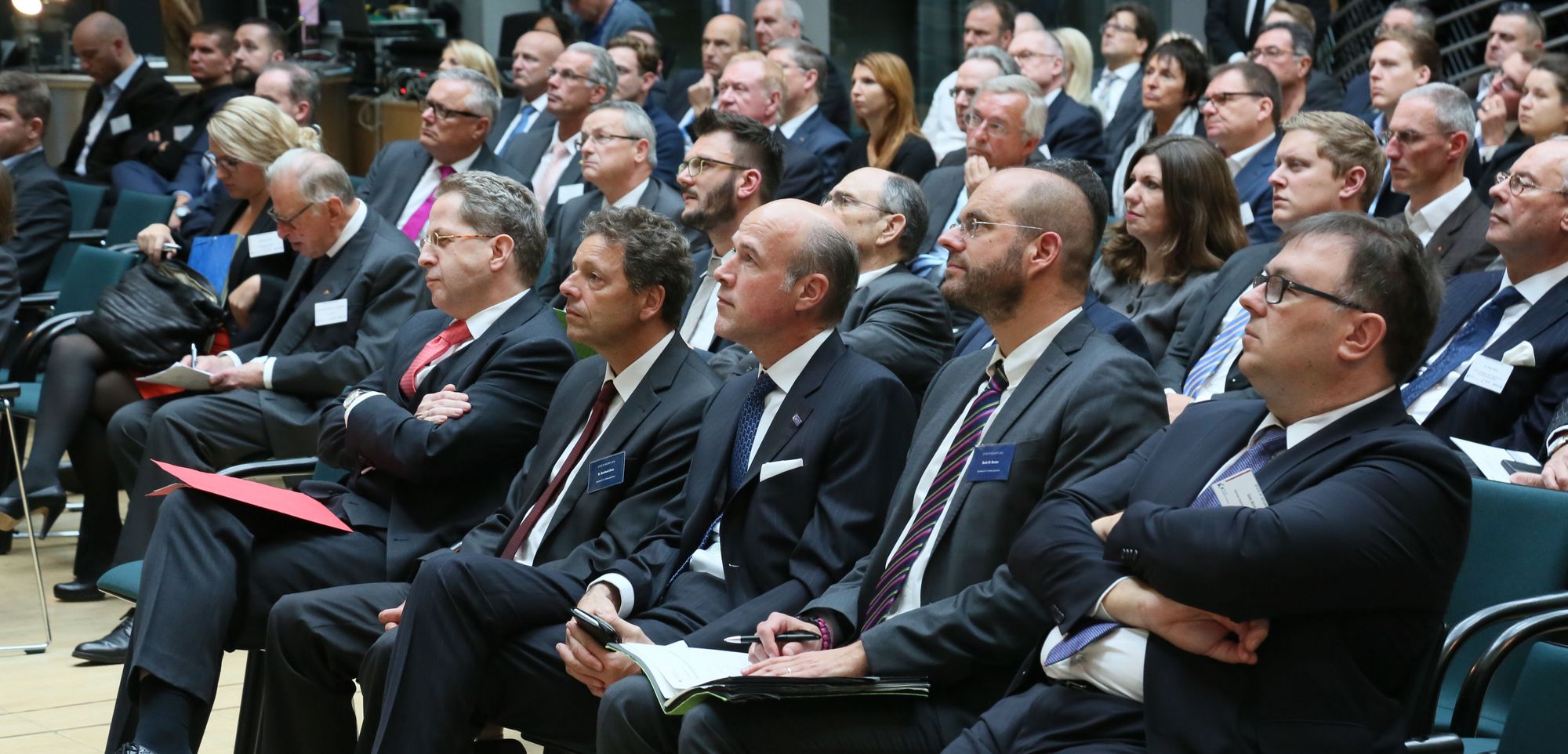Berlin/Essen (26th October 2016). At the third STATE OF SECURITY at Brandenburg Gate, an event held by KÖTTER Security and German Business Protection in cooperation with Allianz SE, 120 participants discussed current and future security risks. Among other issues, the focus was the topic of economic crime, which causes billions of Euros' worth of damages annually for German companies alone.
"Germany is one of the safest countries in the world. This continues to be the case despite this year’s attacks and security threats," Friedrich P. Kötter, amongst others, Board of Directors for the KÖTTER SE & Co. KG Security, Berlin, emphasised yesterday in his opening speech. "In order to maintain this status, we must adapt to our changed situation. This means we have to invest in security, remain innovative and rethink our approach to security."
This applies in particular to the protection against economic crime, as well as to the defence against terrorism and extremism. In times of growing digitisation, a separation between economic protection and cyber security, for example, was said to be no longer appropriate. "With the rapid expansion of networking technology, the risks are changing. So problems that are harmless at first can create a chain reaction and lead to serious damages," said the security expert. Flexible security approaches are more promising than static mechanisms for dealing with these problems; a paradigm change that is currently being implemented in the United States and Great Britain.
With a view to tackling economic and cyber crime, the "human factor" would have to become a stronger focus. "It is, and it remains, a major weak point" said the Vice President of the Federation of Security Management (BDSW). Many firms invested massively in IT security, but they failed to address the ease with which passwords, for example, could be intercepted to override even the most expensive security arrangements.
ASSESSMENTS BY THE BUNDESAMT FÜR VERFASSUNGSSCHUTZ AND BDI
Dr. Hans-Georg Maaßen, President of Bundesamt für Verfassungsschutz (BfV), the domestic intelligence service of the Federal Republic of Germany, and Dr. Stefan Mair, member of the Executive Board of the Bundesverband der Deutschen Industrie (BDI), added to these remarks. They were both representing the "Industry Protection Initiative", which was launched in the spring by the Federal Minister of the Interior, Thomas de Maizière, BDI President Ulrich Grillo and the presidents of the leading security agencies.
BfV President Dr. Hans-Georg Maaßen emphasised during his presentation entitled "The Price of Security" that “security, which is being invested in the state or a company, amounts to a certain price. At the same time a not-quantifiable cost has to be paid which is defined in terms of foregoing certain freedom within the framework of our existing democratic order. It is however indispensable to understand freedom and security not as competing factors, but as equal dimensions that are to be placed in a constructive rapport. As the German statesman Wilhelm von Humboldt said: Without security there is no freedom. Meanwhile, we have become witnesses to a transformational time period when familiar certainties are becoming obsolete and the future is still hiding behind a curtain of uncertainty. In this period, when our security is being challenged by multidimensional risks, Germany has to be more willing to balance the level between freedom and security. In this regard, security services take on an early-warning function and the federal agency for internal security understands itself as society’s fire alarm.”
Dr Stefan Mair also underlined the importance of an effective cooperation between security services and the private sector in his remarks on "Security and Industry 4.0". “Geopolitical developments have become a central issue for German companies. In a globalised world greater connectivity equally means greater vulnerability. The question arises of what Germany’s security policy can do for German businesses. Many of these are however not yet aware of the reality of the risks involved. In particular for small and mediumsized companies there is an urgent need for action and they require the know-how and consultation of qualified security experts. At the same time Germany has adopted adequate data protection laws and IT security is generally of a high standard. So it seems that Germany is ready for industry 4.0. Nevertheless, challenges inevitably persist and security services cannot carry the sole responsibility for the security of German companies.”
ALLIANZ CHIEF ECONOMIST AND OTHER TOP SPEAKERS
Prof. Dr. Michael Heise, Chief Economist of Allianz Group, focused on the micro- and macroeconomic dimensions of security in his presentation "The Economic Value of Security". „The basic human need for security has in many aspects not been fulfilled. In times of complex global challenges, limiting the consequences of economic risks and simultaneously taking preventive measures and precautions has become much more difficult. Businesses themselves are responsible for guaranteeing security, drawing the right conclusions from the existing risks and for preventing potential economic damages. Security has a price and whether firms or private households will invest in it, depends on the state of knowledge of possible threats, on precedents and equally on the subjective risk assessment of the individual.“
Maxim Worcester, Advisory Board of German Business Protection, also touched on this "extremely alarming development" in his comments during the "State of Security in Autumn 2016". The Syrian war, a solution to which currently seems impossible because of the deadlock between the world powers, the United States and Russia, in the UN Security Council, was said to show, as well as the growing rift in the European Union, that "the international community urgently needs to show its ability to take effective action".
Dr Elisabeth Hauschild, head of the Berlin office of Diehl Stiftung & Co. KG ("The Limits of Se-curity"), as well as Brigadier Rob Rider, Defence Attachée of the British Embassy in Berlin, completed the series of top speakers presenting at this year's STATE OF SECURITY.

